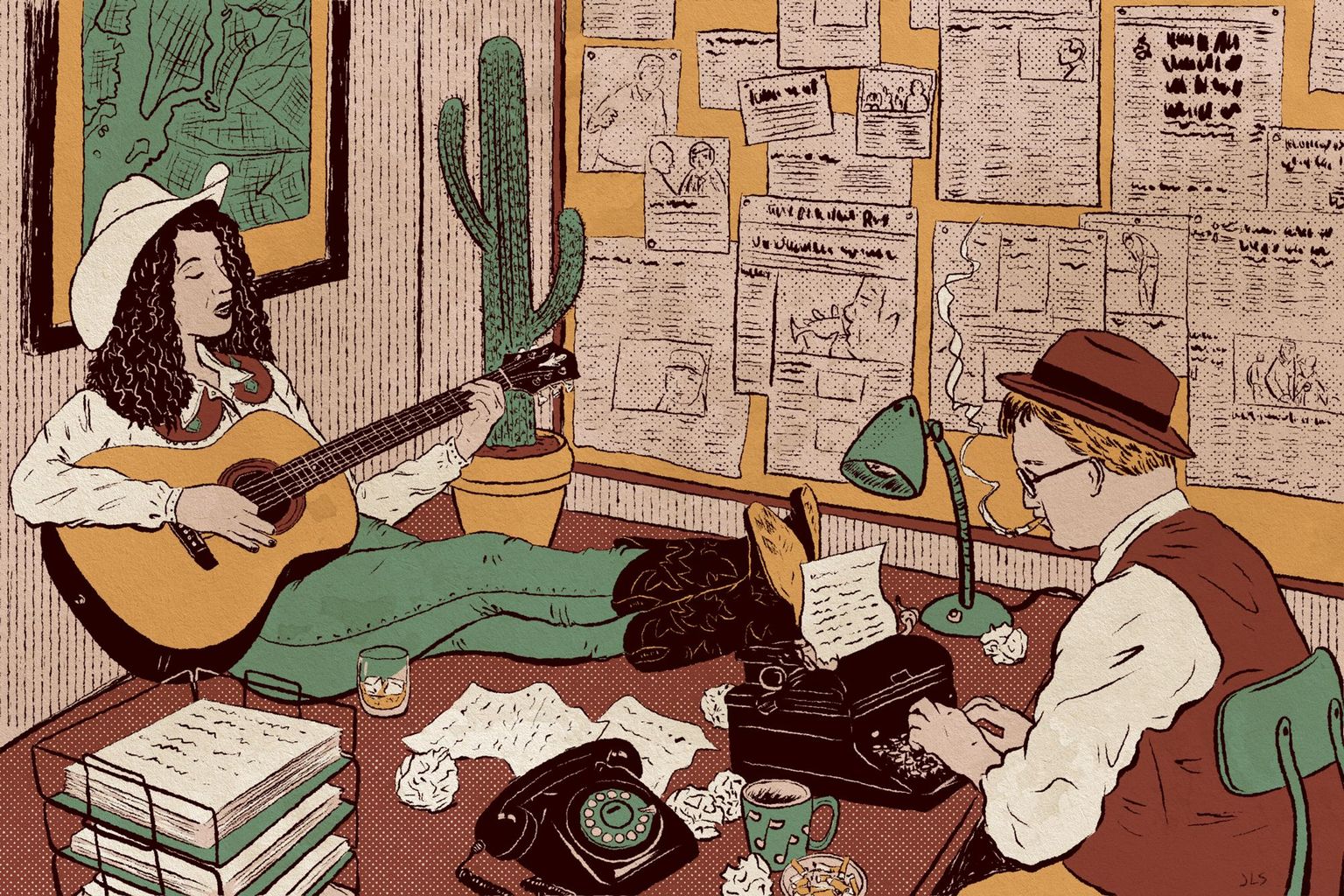Why country songs are the tabloid journalism of music (and tabloid journalism is the country music of news)
Country songs are often derided for their ‘so bad they’re good’ wordplay. But there’s a skill to crafting the perfect country song title—and journalists would do well to take note.

Illustration by Jarett Sitter
Every journalist should, at some point in their career, ideally early on, write for a tabloid newspaper. No more bracing lesson is available in constructing a story—telling its beginning from its middle and its end—and imparting its essence with punchy and economical clarity.
For similar reasons, it is perhaps arguable that every songwriter should be compelled to serve an apprenticeship in country music. It is a genre which, like tabloid newspaper reporting, tells complex yarns simply, and appreciates that a quick sketch can often be the richest portrait. Consider the complete biography, the pageant of hubris and nemesis, the balance of pathos and ethos, the setting of a scene, the story and the moral, the profound stoic fatalism, packed into the mere fourteen syllables that lead off a song written in 1958 by The Crickets’ Sonny Curtis, later a hit for Bobby Fuller, and covered by Hank Williams Jr, Roy Orbison and The Clash, among others: “Breaking rocks in the hot sun/I fought the law, the law won.” Follow that, Aesop.
But there is, within country music, an even more rarefied art of distillation. A tabloid newspaper story has to compress a great deal into very little, filtering a lake of detail into a pot glass of column inches. A tabloid newspaper headline faces the yet more daunting task of conveying the crux of that story in a manner sufficiently intriguing to persuade the reader to buy in. Great country music titles perform a similar role, in often similar fashion.
Sometimes, the titles are, as headlines often are, an extremely brisk precis of the facts. In this category we might find, for example, ‘The Night Hank Williams Came To Town’, written for Johnny Cash by Bobby Braddock and Charlie Williams (this song is also classifiable within the startlingly vast sub-genre of country music about country music, but that’s a whole other essay). The title tells you exactly what you’re getting—a narration of what occurred when the legendary country pioneer played a show in Dallas one October evening in 1951. The lyric, give or take adjustments for rhyme, reads like first-impressions reportage filed to a copy-taker as deadline descends (“A thousand people sweltered in the gym/Then I heard someone whisper ‘Hey, that’s him’”).
There is another respect in which country and tabloids overlap. The reliance of country titles and tabloid headlines on wry wordplay acknowledges what country and tabloids understand supremely well—that tragedy and comedy, especially where matters of the heart are concerned, are often so close to the same thing as makes no odds. A 1975 hit for Gary Stewart will do as an example—‘She’s Actin’ Single (I’m Drinkin’ Doubles)’ (country titles with parentheses being another classification meriting separate consideration). Grudging approval might also be offered to ‘I’m Home Getting Hammered (While She’s Out Getting Nailed)’ which, while magnificent, was written for fictional musicians Banjo & Sullivan in the horror film The Devil’s Rejects (from the same soundtrack, see also ‘I’m Trying To Quit, But I Just Quit Trying’).
These linguistic frolicings descend—or ascend, depending on how you feel about these things—fairly frequently into outright punsmithery. The modern alt.country curmudgeon Robbie Fulks ranks high among masters of this art—his 2005 masterpiece Georgia Hard alone contains ‘Goodbye, Cruel Girl’, ‘All You Can Cheat’ and ‘Countrier Than Thou’ (the latter is a rebuke to appropriating poseurs from non-country jurisdictions—or, as Fulks indicts them, “Alabama-teurs”, and “Robert E. come-late-Lees”, among other imprecations, but country songs vexed about things being kept insufficiently country is, again, a whole other matter).
The question thus prompted is why country music has appreciated the fun to be had with titles in a way other genres of popular music have not.
Country music and tabloid journalism also both suffer the mockery of the high-falutin’, fancy-pants, book-learnin’ classes—but country music especially tells better jokes against itself than its detractors ever conjure. There are, in online circulation, several chortling lists of what are billed as Bad Country Song Titles, but many are comprised of titles which are either apocryphal, or, upon mature reflection, absolutely brilliant.
Consider one common inclusion on such lists. ‘Dropkick Me, Jesus, Through The Goalposts Of Life’ was a 1976 hit for Bobby Bare, written by Paul Craft. That title does what a great headline should do. It intrigues, and beckons—who, upon reading that, would not want to hear the song? And crucially, the lyric absolutely nails the conceit, holding the wilfully ridiculous metaphor skilfully together (“Free from the Earthly tempestion below/I’ve got the will, Lord, if you’ve got the toe.”) Craft understood that unwieldiness can be a superpower in a song title. So did East Nashville’s premier stoner poet Todd Snider when he wrote his protest song about conservative Christian right-wing Republican straight white American males and called it ‘Conservative Christian Right-Wing Republican Straight White American Males’.
Other great country titles also demonstrate a keen understanding of the power of a self-contained—yet unexpected—rhyme. The ne plus ultra of this variety is Whitey Shafer’s ‘All My Exes Live In Texas’, later a hit for George Strait. Again, Shafer is all in on the gag, the lyrics taking increasingly riotous liberties with the challenge the title implicitly establishes (“Allison in Galveston somehow lost her sanity/And Dimples, who now lives in Temple, got the law out looking for me”).
These rickety rhymes therefore also usher Shafer’s song into the lexicon of country titles whose appeal is predicated on an already acquired understanding of the legend of the performer. The greatest male country vocalist of them all, George Jones—a man once hailed by Frank Sinatra as the second-best singer in America—recorded a hefty catalogue of such titles, most obviously ‘No Show Jones’, which repurposed as autobiography the nickname earned by years of alcoholic unreliability. Most dazzlingly in this regard, however, Jones duetted with Ray Charles on 1984’s 'We Didn’t See A Thing’—a very funny song about two faithless men promising to vouch for each other’s alibis, lent an additional depth of baleful humour by the fact of Charles’ blindness.
The question thus prompted is why country music has appreciated the fun to be had with titles in a way that other genres of popular music have not—in rock and pop, the title of a song tends just to be the most prominent line from its chorus. There is the same possible, if uncharitable, explanation that applies to tabloid headlines—that the puns and other wordplay are cheap and tawdry linguistic flashbangs detonated to catch the eye (or the ear) of an unsophisticated audience.
But this will not do. If we are going to—and we should—extend due credit to the literary chops of the people who conjure these terse apercus, then we must surely also acknowledge that their readers (and/or listeners) appreciate them on their own merits. Johnny Paycheck did not record 1977’s ‘The Only Hell My Mama Ever Raised’, nor Loretta Lynn 1966’s ‘You Ain’t Woman Enough (To Take My Man)’ principally to earn the applause of the beard-stroking critics of subsequent decades.
The unscientific assessment of this particular beard-stroking critic is that country music is like this because its heartland—the southern United States—is like this. I know of no easier place in the world to be a visiting journalist. Just as the great country singers of the region trade in confessional intimacies, so the people of the south will tell you absolutely everything about themselves and their lives, whether you want them to or not. And just as the great country writers enjoy turning their phrases and toying with the language, so the quotes that fill your notepad as you talk to southerners in any line of work are as notable for their quality as their quantity.
It is a shame for any number of reasons that Shel Silverstein is no longer with us. (Though a pedant might at this point quibble that he was from Chicago, his songs were recorded by—among others—Johnny Cash, Waylon Jennings, Emmylou Harris and Kris Kristofferson, so the pedant is at this point invited to get knotted). Silverstein, the composer of such impeccably, knowingly wrought country standards as ‘A Boy Named Sue’, ‘Sylvia’s Mother’ and ‘The Cover of the Rolling Stone’ could have had immense fun with a concept album of songs titled by actual tabloid headlines. There is one in particular, splashed by the New York Post in 1983, still spoken of in whispers by awed hacks as the pinnacle of the headline writer’s art, summing up—just as the great country titles do—a lurid and complicated story in a brutal minimum of syllables. You can almost hear Margo Price, Angeleena Presley or Sturgill Simpson introducing their version of Silverstein’s new tune, ‘Headless Body In Topless Bar’.
Looking for the soundtrack? We've compiled a playlist of country music's smartest, most breathlessly strained song titles. Listen on Spotify.
